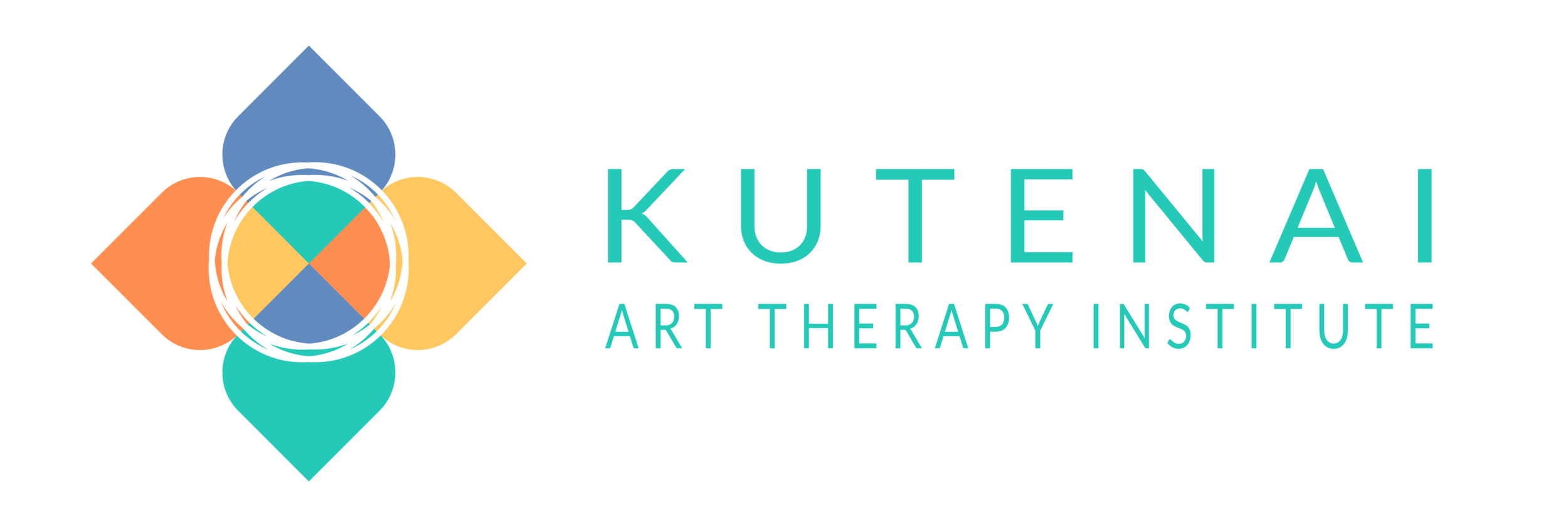At KATI, we use the term Groundwater to refer to our ongoing commitment to decolonization and reconciliation. Groundwater is an upswelling of force—a fluid, life-giving, equalizing force that can be neither contained nor denied. Our Groundwater commitment recognizes the role of creativity and art in Indigenous approaches to healing, the ongoing traumatic and intergenerational impacts of colonialism, and the therapeutic value of our connections with the natural world.
Over 10 years ago, the Kutenai Art Therapy Institute (KATI) started the Groundwater Initiative to advocate for Indigenous-centered art therapy education, while committing to ongoing processes of decolonization and reconciliation. We are grateful for the wisdom of our Elders and colleagues who envisioned the initiative of Groundwater and set KATIA on an intentional path of decolonization and reconciliation. Thank you to Monica Carpendale, Donna Wright, Audrey Ward, Fyre Jean Graveline, Joan Hall, Richard Campbell, Michelle Juba Reid, and Frank Tester who all put time and energy into bringing this vision alive through many discussions and a Groundwater Symposium at KATI in 2014.
As an educational institution, KATI is committed to upholding the UN Declaration on the Rights of Indigenous Peoples and the Calls to Action as outlined by the Truth and Reconciliation Commission of Canada. We celebrate the richness and potency that can arise in collaboration between the field of expressive arts therapy and Indigenous knowledge, worldviews, and practices.
The faculty, staff and Board of KATIA see decolonization and reconciliation as an ongoing movement of growth and reckoning, rather than a fixed objective to be achieved. KATI is committed to continue these processes by:
Acknowledging how the lived experiences of Indigenous Peoples, past, present and future, are linked to historical and ongoing colonialism
Acknowledging that the history of “art therapy” as a profession is built on ethnocentric assumptions regarding health and illness
Educating ourselves about Indigenous relational worldview concepts and how they apply to creative arts processes and practices for healing
Supporting Indigenous reclamation within the art therapy profession.
Supporting the Truth & Reconciliation Commission Calls to Action
Some of the specific ways that KATI works to address the Calls to Action include:
Honoring and welcoming Indigenous ways of healing, teaching, knowing, and being
Consulting with Indigenous Elders, knowledge keepers, leaders and professionals in education and health care in relation to providing services to Indigenous community members, supporting Indigenous students, and decolonizing the course curriculum
Committing to an ongoing process of decolonizing course curricula through peer review in response to student and faculty feedback, cultural protocols, and Indigenous research
Teaching culturally safe and responsive curricula:
Include teachings on the impact of colonization and intersecting oppressions (racism, sexism, classism), residential schools, the sixties scoop, intergenerational complex trauma, complex grief and loss and suicide
Acknowledge and honour Indigenous ways of knowing, land-based healing, and traditional healing practices (smudging, medicine wheel, talking circle) within the context of art therapy.
Acknowledge the risk of harm in perpetuating acts of cultural appropriation and tokenism; and endeavour to mitigate the risk of inadvertently causing harm.
Increasing the number of professionally trained Indigenous art therapists
Reduce barriers for Indigenous students
Increase cultural safety and belonging for Indigenous students
Training culturally conscious art therapists
Increasing cultural competency among KATI faculty and staff through culturally relevant professional development offerings
Offering support to community-based art responses and events that raise awareness, give voice and honour the lived experiences of Indigenous peoples
Encouraging and supporting student initiatives in practice and research to develop art therapy programming that supports Indigenous healing and cultural reclamation
Offering culturally safe art therapy services to the community.
A Statement of Principles and Ethics
The following is a statement of ethical principles that apply to faculty, staff, and students in the program.
To respect, honour and show reverence for life in everyday practice
To recognize the interrelationships of all things and the sacredness of all life and to act accordingly within All my Relations
To endeavour to treat clients/participants, fellow students, and colleagues with kindness, honesty, and dignity
To commit to personal growth and the development of self-awareness regarding one's impact on others
To appreciate and recognize the unique and diverse cultural contexts and experiences of Indigenous peoples
To acknowledge and employ these principles in the practice of community and creative arts therapy.

